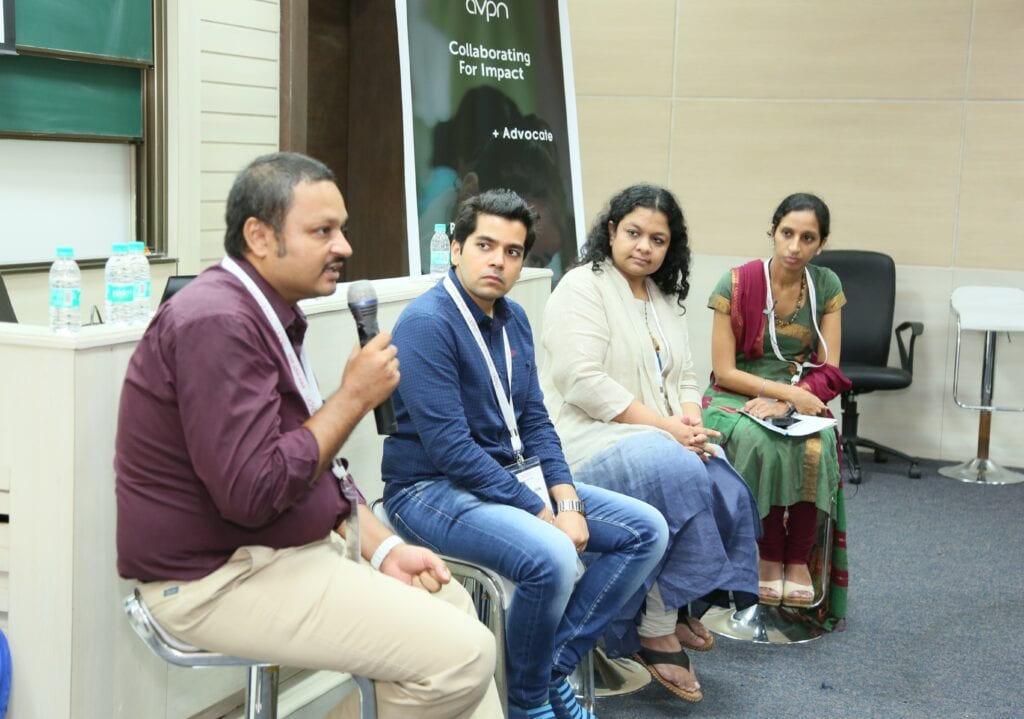- A social organization’s ability to solve development issues at scale is restrained by its institutional capacity.
- Providing formal training programs and opportunities for leadership development is a huge area of need for the education sector in India
- The ability to demonstrate evidence of impact is important to garner long term funding that is critical for organisations to scale up.
- Creating impact at scale requires a supportive ecosystem.
Last week, I moderated a panel on ‘Building capacity to scale impact’ at the AVPN India Summit 2017. This is a topic very close to my heart and something Dasra has been working towards for the last 18 years. It is very clear that solving India’s development issues to enable a billion people to live with dignity and equity requires solutions at scale. Often, a social organization’s ability to solve development issues at scale is restrained by its institutional capacity. There is a continuous need for organizations to invest in themselves in order to manage growing pains and become resilient to changing realities. Despite this, capacity building is often not considered a priority and leaders do not factor it into yearly budgets.
The panel discussion, which brought together perspectives from funders and non-profits, highlighted that critical areas of gaps in organizational capacity are internal leadership development and human resource management, impact assessment and fundraising capabilities.
Pooja Taparia, Founder of Arpan – a NGO that works to prevent child sexual abuse, highlighted that non-profits are often founded because of passion. Hence, founders may be unfamiliar with development sector discourse and management skills required to grow an organization. She admitted that since she is a graphic designer by training, phrases like a ‘five year business plan’ or an ‘impact assessment framework’ were buzz words to her.
This is similar to Dasra’s experience of scaling a range of non-profits over the years. It has underscored our view that the stronger the leadership team, the higher the organizational performance and the greater the impact on the ground. Leaders with access to the right knowledge, skills and networks can create strategic vision, grow high-performing teams, implement effective programs, build sustainable organizations, and thereby create lasting change. This has been reiterated also in a recent report by Bridgespan on “Filling the Leadership Gap” – their survey of 244 organizations revealed that 97% of organizations agree that leadership development is critical and 53% are not confident about their second line management. 98% of the surveyed participants from organizations had not been through formal training programs or heard of opportunities. This is a huge area of need for the sector. Dasra Social Impact Leadership program, Strategic Non Profit Management-India, Aspire Circle Fellowship are a few examples of such programs that exist – but it’s not enough!
Surya Loonker from Give2Asia reiterated that scaling impact requires a focused approach with clarity on a key outcome and a replicable model that targets just that. Often, organizations try to do too many things and hence reduce their ability to focus on scaling up. Having a clear long term goal and vision is critical to any organization’s growth, and will allow to effectively channel the required resources to do so. Organizational capacity development through investment in people, processes and technology should form a part of that growth story and should not be seen as a separate project for funding.
Long term funding can be critical to give organizations the runway for investment and scale up. For that, the ability to communicate a well thought out plan and vision to show impact is crucial. The ability to demonstrate evidence of impact is important. The non-profits in the room spoke about the hesitance and challenge of being able to measure the change that they were making because most often, it is neither short term nor tangible. Nonetheless, the room agreed that it is critical for organizations to build the capacity to be able to articulate it – and even discourse in the sector needs to support their ability to do so.
The funding landscape has evolved over the last few years and there are a greater number of funding sources available to organizations. Piyush Jain, the CEO of Impact Guru, a crowd-funding platform, spoke of innovative mechanisms for funding that are now available and how organizations can choose where to focus efforts. Any form of fundraising requires significant time and effort; and organization should choose where to target and create their pitch accordingly.
Most pertinently, we must not forget that creating impact at scale is not just about non-profits scaling up, but rather a supportive ecosystem that enables this scale up. Philanthropy can play a huge role in supporting this by driving more strategic capital to the sector, which supports not just implementation of projects on ground but rather supports organizations in scaling up successful models and provides/builds growth resources to do so.
The time is ripe. If all stakeholders in this sector can come together and collaborate, I do believe that social change can be accelerated!


















